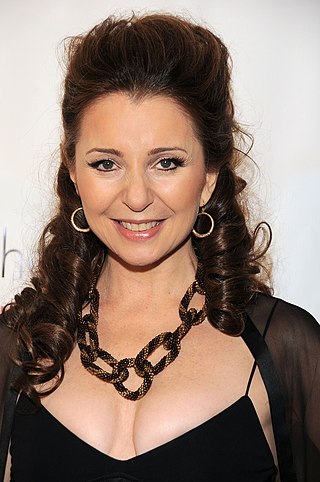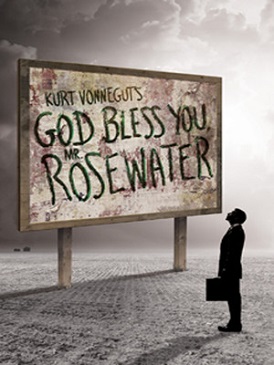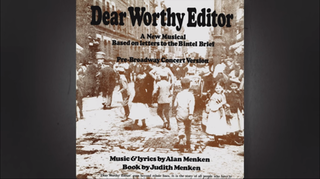
Alan Irwin Menken is an American composer, pianist, music director, and record producer, best known for his scores and songs for films produced by Walt Disney Animation Studios. Menken's music for The Little Mermaid (1989), Beauty and the Beast (1991), Aladdin (1992), and Pocahontas (1995) has each won him two Academy Awards. He also composed the scores and songs for Little Shop of Horrors (1986), Newsies (1992), The Hunchback of Notre Dame (1996), Hercules (1997), Home on the Range (2004), Enchanted (2007), Tangled (2010), and Disenchanted (2022), among others. His accolades include winning eight Academy Awards — becoming the second most prolific Oscar winner in the music categories after Alfred Newman, a Tony Award, eleven Grammy Awards, seven Golden Globe Awards, and a Daytime Emmy Award. Menken is one of nineteen people to have won an Emmy, a Grammy, an Oscar and a Tony.
Lynn Ahrens is an American songwriter, and librettist for the musical theatre, television and film. She has collaborated with Stephen Flaherty for many years. She won the Tony Award, Drama Desk Award, and Outer Critics Circle Award for the Broadway musical Ragtime. Together with Flaherty, she has written many musicals, including Lucky Stiff, My Favorite Year, Ragtime, Seussical, A Man of No Importance, Dessa Rose, The Glorious Ones, Rocky, Little Dancer and, recently on Broadway, Anastasia and Once on This Island.

Judy Kuhn is an American actress, singer and activist, known for her work in musical theatre. A four-time Tony Award nominee, she has released four studio albums and sang the title role in the 1995 film Pocahontas, including her rendition of the song "Colors of the Wind", which won its composers the Academy Award for Best Original Song.

Donna Murphy is an American actress, best known for her work in musical theater. A five-time Tony Award nominee, she has twice won the Tony for Best Actress in a Musical: for her role as Fosca in Passion (1994–1995) and as Anna Leonowens in The King and I (1996–1997). She was also nominated for her roles as Ruth Sherwood in Wonderful Town (2003), Lotte Lenya in LoveMusik (2007), and Bubbie/Raisel in The People in the Picture (2011).

Beauty and the Beast is a Disney stage musical with music by Alan Menken, lyrics by Howard Ashman and Tim Rice, and a book by Linda Woolverton. Adapted from Walt Disney Pictures' Academy Award-winning 1991 animated feature musical film of the same name – which in turn had been based on the classic French fairy tale by Jeanne-Marie Leprince de Beaumont – Beauty and the Beast tells the story of an unkind prince who has been magically transformed into an unsightly creature as punishment for his selfish ways. To revert into his true human form, the Beast must learn to love a bright, beautiful young lady who he has imprisoned in his enchanted castle before it is too late.

Disney Theatrical Productions Limited (DTP), also known as Disney on Broadway, is the stageplay and musical production company of the Disney Theatrical Group, a subsidiary of Disney Entertainment, a major division and business unit of The Walt Disney Company.
David Joel Zippel is an American musical theatre lyricist, director, and producer.

The Lion King is a stage musical with music by Elton John, lyrics by Tim Rice, and a book by Roger Allers and Irene Mecchi, with additional music and lyrics by Lebo M, Mark Mancina, Jay Rifkin, Julie Taymor, and Hans Zimmer. It is based on the 1994 Walt Disney Animation Studios' film of the same name. Directed by Taymor, the musical features actors in animal costumes as well as giant, hollow puppets. The show is produced by Disney Theatrical Productions.

On the Record is a jukebox musical revue featuring many classic songs from a variety of live action and animated films and television series produced by Walt Disney Pictures, Broadway musical plays produced by Walt Disney Theatrical, and even Disneyland attractions. This theatrical celebration of 75 years of Disney music tells the story of four singers recording a greatest hits album in a magical recording studio. After opening in Cleveland in 2004, the production toured for nine months, visiting 24 cities in the United States before closing in Denver in mid-2005.
"A Change in Me" is a song written by composer Alan Menken and lyricist Tim Rice for the musical Beauty and the Beast, a stage adaptation of Disney's 1991 animated film of the same name. The song was written specifically for American singer Toni Braxton when she joined the production to play the role of Belle in 1998, four years into the musical's run. Menken and Rice wrote "A Change in Me" to appease Braxton after Rice promised the singer, who was hesitant to sign her contract, that he would write an entirely new song for her to perform in the musical on the condition that she finally agree to play Belle.

The Little Mermaid is a stage musical produced by Disney Theatrical, based on the animated 1989 Disney film of the same name and the classic story by Hans Christian Andersen about a mermaid who dreams of the world above the sea and gives up her voice to find true love. Its book is by Doug Wright, music by Alan Menken and lyrics by Howard Ashman, with additional lyrics by Glenn Slater. Its underwater setting and story about aquatic characters requires unusual technical designs and strategies to create gliding movements for the actors.

The Hunchback of Notre Dame is a musical play with music and lyrics by Alan Menken and Stephen Schwartz, and a book by James Lapine and Peter Parnell. Based on the 1831 novel of the same name written by Victor Hugo and the 1996 Walt Disney Animation Studios film adaptation.

Casey Nicholaw is an American theatre director, choreographer, and performer. He has been nominated for several Tony Awards for his work directing and choreographing The Drowsy Chaperone (2006), The Book of Mormon (2011), Aladdin (2014), Something Rotten! (2015), Mean Girls (2018), The Prom (2019), and Some Like It Hot (2023) and for choreographing Monty Python's Spamalot (2005), winning for his co-direction of The Book of Mormon with Trey Parker and his choreography of Some Like It Hot. He also was nominated for the Drama Desk Awards for Outstanding Direction and Choreography for The Drowsy Chaperone (2006) and Something Rotten! (2015) and for Outstanding Choreography for Spamalot (2005).

Aladdin is a stage musical based on Disney's 1992 animated feature film of the same name with a book by Chad Beguelin, music by Alan Menken and lyrics by Howard Ashman, Tim Rice and Beguelin. It resurrects three songs written by Menken and Ashman for the film but not used, and adds four songs written by Menken and Beguelin.
"Proud of Your Boy" is a song written by lyricist Howard Ashman and composer Alan Menken. Originally intended for Disney's animated film Aladdin (1992), the song was omitted when Aladdin's mother was written out of the story. After being discarded, "Proud of Your Boy" remained largely undiscovered by audiences until Walt Disney Records released Ashman and Menken's demo on a compilation album in 1994, after which it gradually gained popularity. The song was eventually restored for the film's stage musical adaptation in 2011, originally performed and recorded by American actor Adam Jacobs. Lyrically, "Proud of Your Boy" is about a young man promising his mother that he will change his mischievous ways and ultimately make her proud.
"If I Can't Love Her" is a song written by composer Alan Menken and lyricist Tim Rice for the musical Beauty and the Beast (1994), a stage adaptation of Disney's 1991 animated film of the same name. Sung by the Beast after he frightens Belle away from the castle, "If I Can't Love Her" details the characters' struggles to love her. The song was first performed by American actor Terrence Mann, who both originated the role of the Beast on Broadway and recorded it for the show's original cast album.

Kurt Vonnegut's God Bless You, Mr. Rosewater is a 1979 musical that marked the first collaboration of composer Alan Menken and writer Howard Ashman. Based on Kurt Vonnegut's 1965 novel of the same name, the musical tells the story of Eliot Rosewater, a millionaire who develops a social conscience and creates a foundation to improve the lives of the citizens of an impoverished Indiana town.

Adam Jacobs is an American actor and singer. He is best known for originating the title role of Aladdin in Disney's Aladdin on Broadway. He also starred as Marius in the Les Miserables 2006 Broadway Revival, and Simba in Disney's The Lion King on Broadway.

Dear Worthy Editor: Letters to The Daily Forward is a 1960s or c. 1974 musical and one of the early works by Alan Menken. He collaborated with his mother to develop the musical, adapted from the Bintel Brief letters-to-the-editor published by the Yiddish-language newspaper Jewish Daily Forward. While Menken had written musicals prior to this, it became his first work to achieve a level of success, being performed many times in the Jewish-American circuit.

Hercules is a musical based on the Walt Disney Animation Studios 1997 film of the same name. The music and lyrics were written by Alan Menken and David Zippel, with a book by Kristoffer Diaz and Robert Horn. The production is also loosely based on the legendary hero of the same name, the son of Zeus, in Greek mythology.















